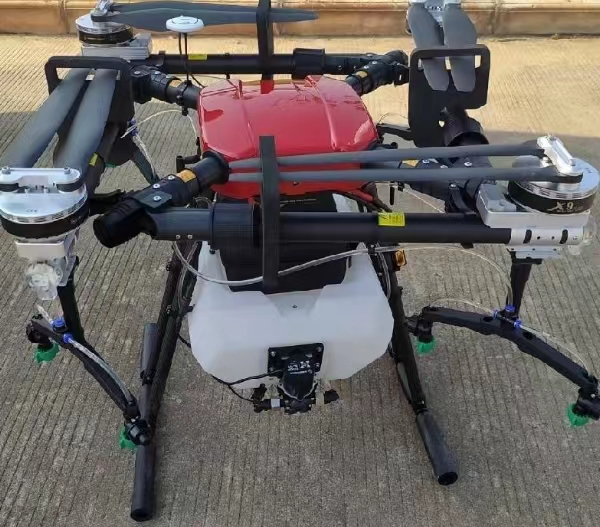![图片[1]-Sustainable Vegetable Farming: Reducing Chemical Runoff with Drone Spraying-msoen](https://www.msoen.com/wp-content/uploads/2025/02/226924272f8c-579x1024.jpg)
![图片[2]-Sustainable Vegetable Farming: Reducing Chemical Runoff with Drone Spraying-msoen](https://www.msoen.com/wp-content/uploads/2025/02/5ea54cb1fb9b.jpg)
![图片[3]-Sustainable Vegetable Farming: Reducing Chemical Runoff with Drone Spraying-msoen](https://www.msoen.com/wp-content/uploads/2025/02/18f9935bb581.jpg)
![图片[4]-Sustainable Vegetable Farming: Reducing Chemical Runoff with Drone Spraying-msoen](https://www.msoen.com/wp-content/uploads/2025/02/0d00336d5fe6-1024x769.webp)
![图片[5]-Sustainable Vegetable Farming: Reducing Chemical Runoff with Drone Spraying-msoen](https://www.msoen.com/wp-content/uploads/2025/02/0f1391077c98-1024x769.jpg)
The integration of drone technology into agriculture is transforming traditional farming methods, particularly in vegetable cultivation. Agricultural drones, especially those designed for spraying, are becoming a powerful tool for modern farmers seeking increased efficiency, reduced labor costs, and enhanced crop health. This article explores how agricultural drones are reshaping vegetable farming through precision spraying.
What Are Agricultural Spraying Drones?
Agricultural spraying drones are unmanned aerial vehicles (UAVs) equipped with tanks and nozzles designed to apply pesticides, herbicides, and fertilizers. These drones fly over crop fields and spray with high accuracy, targeting specific areas that need treatment while minimizing waste.
Benefits of Using Drones to Spray Vegetables
- Precision Application
Vegetables require careful pesticide and fertilizer management due to their sensitivity and consumption by humans. Drones allow for targeted spraying based on GPS and field mapping, ensuring even coverage while avoiding overuse of chemicals.
- Reduced Labor Costs
Manual spraying is labor-intensive, time-consuming, and often exposes workers to harmful chemicals. Drones automate this process, significantly cutting down on labor costs and enhancing safety on the farm.
- Increased Efficiency
A spraying drone can cover several hectares per hour, depending on its capacity and speed. This efficiency is crucial during critical periods such as pest outbreaks or disease control in vegetables like lettuce, spinach, tomatoes, and peppers.
- Access to Difficult Terrain
Vegetable fields located on hillsides, wet areas, or uneven land can be challenging for tractors or manual sprayers. Drones can easily access such locations, ensuring consistent treatment regardless of terrain conditions.
- Environmentally Friendly
Drones help reduce chemical runoff by applying chemicals precisely where needed. This reduces environmental impact and supports sustainable farming practices.
How Spraying Drones Work on Vegetable Farms
- Pre-Flight Mapping: Using satellite or drone-generated images, the farm is mapped to identify the areas requiring treatment.
- Flight Planning: A flight path is programmed into the drone’s software, including altitude, speed, and spray parameters.
- Loading and Launch: The drone is filled with the appropriate spray liquid and launched with minimal manual input.
- Autonomous Operation: The drone follows the pre-set path and sprays the vegetables with consistent pressure and dosage.
- Post-Flight Reports: After the mission, detailed data is available to assess spray coverage and adjust future applications.
Challenges and Considerations
Battery Life: Most drones have limited flight times, often requiring recharging or battery swaps during large-scale operations.
Weather Dependency: Wind and rain can impact spray accuracy and drone stability.
Regulations: Farmers must be aware of local aviation and agricultural regulations regarding drone use.
The Future of Drone Spraying in Vegetable Farming
As drone technology continues to advance, we can expect improvements in payload capacity, AI-based disease detection, and swarm spraying systems. With data integration from sensors and precision agriculture platforms, drone spraying will become even more intelligent and automated.
Conclusion
Agricultural spraying drones are revolutionizing vegetable farming by offering a safer, faster, and more precise alternative to traditional spraying methods. For farmers looking to modernize their practices, reduce chemical usage, and improve crop yield, drone technology offers a promising path toward sustainable and efficient vegetable cultivation.






暂无评论内容